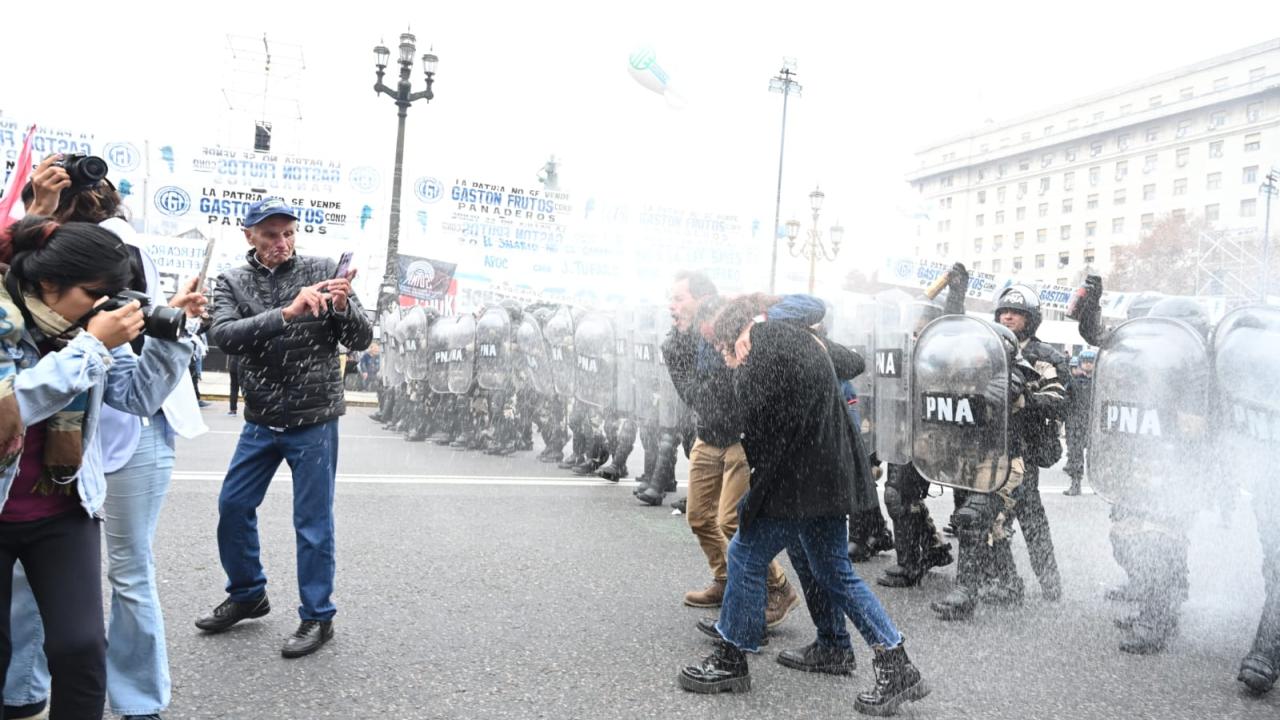
The discussion of the reform is a crucial step for the government of Javier Milei, which six months after starting has not achieved legislative support.
Serious incidents between protesters and the Police in front of the Argentine Congress left several injured this Wednesday, including five deputies affected by the gases, and cars on fire, while the Senate debates a crucial reform package for President Javier Milei.
The riots began when protesters sought to circumvent the fence system set up to isolate Congress and were repelled by gas, rubber bullets and jets from tanker trucks.
The protesters reacted by throwing stones at the uniformed officers and at least two cars were set on fire, including one belonging to the Cadena 3 media outlet. When consulted by AFP , the Police did not provide a balance of injuries or arrests.
At least five deputies were gassed by the Police and had to be hospitalized while dozens of protesters were assisted at the scene, also affected by the gases, according to legislators and an NGO.
Within Congress, the Bases law was being debated, a crucial step for the Milei government that, six months after starting, has not achieved legislative support.
"It is a very violent day, in 40 years of democracy I have never seen such repression," opposition deputy Cecilia Moreau told AFP when confirming that five colleagues who accompanied the demonstration were hit by the gas.
"Roberto María La Cruz Gómez, I am a Peronist and I am here to prevent the Bases law from being passed, because I am Argentine!" shouted a young man while being detained by federal police.
A commission of senators interceded with the security forces to try to calm things down while the debate continued, which is expected to last until the early hours of Thursday, June 13.
The Senate debates the Bases law, which in its 238 articles includes incentives for large investments for 30 years, a labor reform, privatizations and a controversial delegation of legislative powers to the president, in need of legislative support after six months of government without the approval of any law.
The labor reform in particular "returns to the last century when the employee did not have any labor rights, does not withstand constitutional analysis and will generate conflict and litigation," accused opposition senator Mariano Recalde.
The law had already been approved by the Chamber of Deputies in April 2024. If the senators support it, the text will return to the Lower House for final approval.
Milei defends his reform package
"The effort of Argentines in these months is enormous, we hope (with this law) to lay the foundations for progress," said pro-government senator Bartolomé Abdala in his opening speech.
Milei, who leaves this Wednesday night for Italy to participate in the G7 summit, defended his reform package: "They have been discussing the Bases law for six months, which would have made the adjustment less painful, but politics does not care about that." matters," said the ruler.
The legislative route has been uphill for La Libertad Avanza, Milei's small party, a minority in both chambers.
"From the IMF to foreign investors, many actors say that, for Milei's proposal to be credible, laws from Congress are needed, agreements are needed, a more or less functioning State is needed," Iván Schuliaquer, commented to AFP , political scientist from the University of San Martín.
The debate is taking place in a context of an economy in recession, with a collapse in industrial activity and consumption, thousands of layoffs and slowing inflation, but still around 300% year-on-year.
The weight of the adjustment fell mainly on pensions and the purchasing power of salaries in a country with half of its population in poverty.
The project failed in its first attempt in the Chamber of Deputies and to revive it the Government made numerous concessions until reducing its original content from 600 articles to a third.
In the Senate, President Milei has only seven of the 72 seats and needs the vote of 37 legislators for approval.
If the package is rejected, Milei will have to wait a year to push it again.
Argentina's Senate will also debate a parallel tax reform, which includes reinstating an income tax to tax salaries and pensions.









